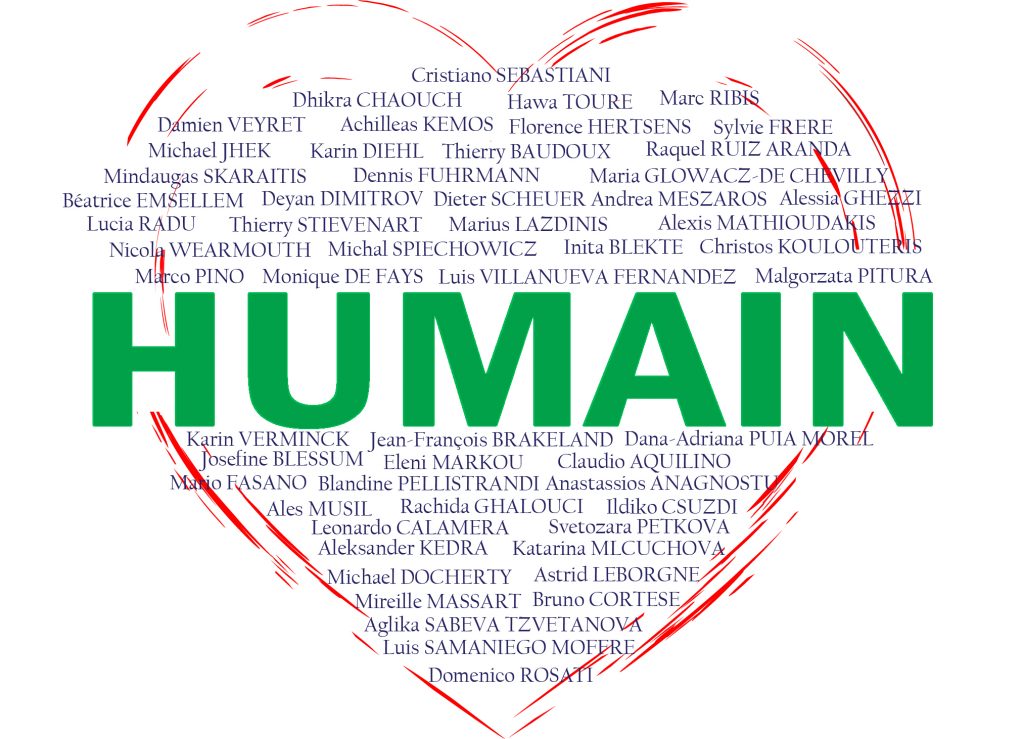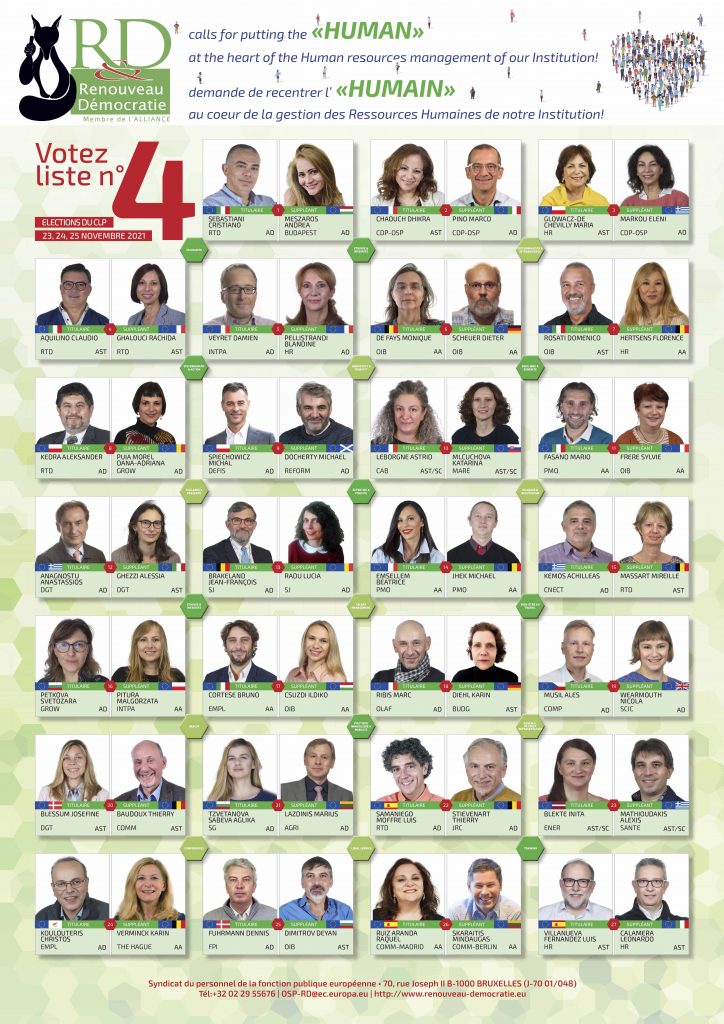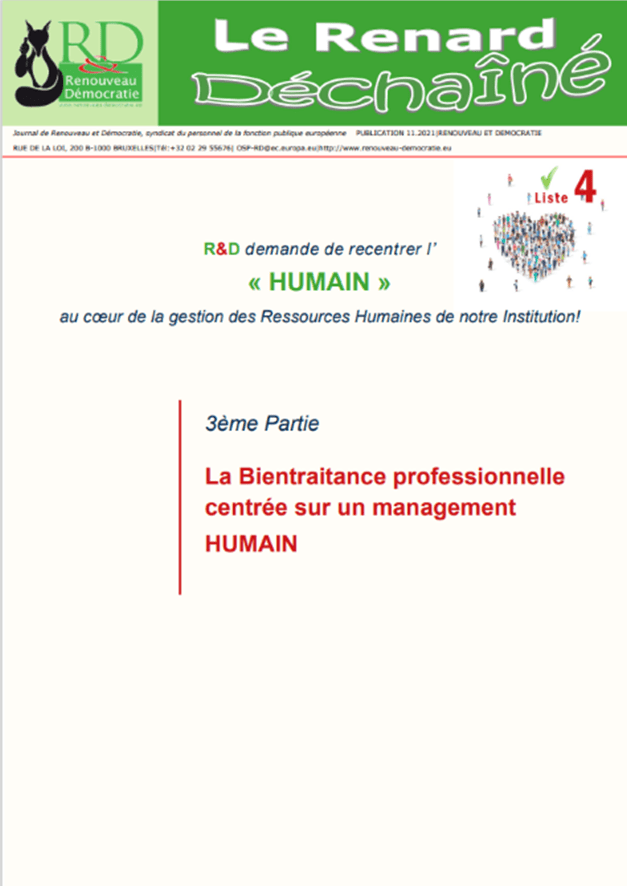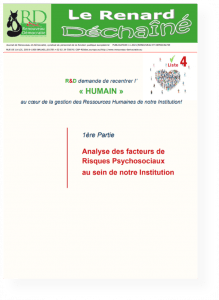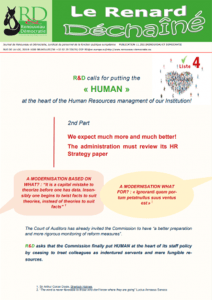R&D calls for putting the « HUMAN »
At the heart of the Human Resources management of our Institution!
3rd Part—Professional welfare focused on HUMAN management
The European Union as an employer
is a unique model which has not yet found its place as such and which is still working with bureaucratic and/or Taylorist organisational models. The European institutions, and in particular the Commission, must consider creating an organisational method based on the values of the European Union of universalism and benevolence. It is necessary, first and foremost, to ensure benevolence through the preservation and improvement of the staff’s well-being and to ensure smooth functioning within the services, including understanding, judgement, tolerance and protection of the staff.
But how can this kind of management be done when for decades, and in particular with the damage caused by the two reforms, management is based on the old Human Resources Management (HRM) Systems without ever questioning itself?
R&D has already carried out an analysis of psychosocial risk factors within our services (link Renard Déchaîné). On this basis, R&D invited the best experts in occupational sociology, prevention of psychosocial risk factors and human management (link of conferences).
REVOIR NOS E-CONFERENCES SPECIFIQUES A CE DOSSIER
The Mondays of Psychosocial Risks—Marie PEZE
Pourquoi le travail nous rend-il malade? REPLAY
Institutional psychological harassment, when work organisation and pathogenic management push the victim to extremes! REPLAY
Le management pathogène, de quoi parlons-nous? REPLAY
Les RPS et la QVT, de quoi parlons-nous? REPLAY
Today, R&D proposes the establishment of HUMAN management based on professional welfare promoting “Meaning to work” and “Recognition”!
Implementing the meaning to work
For work to have a meaning, it must provide satisfaction to the person doing it, correspond to her/his interests, use her/his skills, stimulate the development of her/his potential and enable her/him to achieve her/his objectives (giving meaning to work — irsst). It therefore enables psychological well-being. The opposite is a psychosocial risks factor.
Two working conditions show a significant link with the meaning of work: the lack of both material resources and of personal development (Arnoux-Nicolas, 2015).
In order to implement a sense to work and promote the well-being of the staff, R&D calls for a “meaning of work” policy based on:
- The use of employees’ resources and skills
- Better career prospects
- A training policy tailored to the needs of staff so that they can evolve in their department or with a view to mobility
- The recognition of talent within the services
- Regular feedback of the work done by the immediate superior
- Good autonomy
- Good quality of relations
- Absence of conflicts of values
- Building a collective identity
- Good work-life balance
- Professional and personal development
Developing recognition at work
There are 4 forms of recognition :
- Existential recognition: recognising the employee for what he/she is;
- Recognition of work practice: recognising the employee for her/his professional qualities;
- Recognition of investment in work: recognising motivation and the energy invested in work;
- Recognition of results: the objectives are met.
Recognition may be individual or collective, manifest itself through both official and unofficial measures and, in any case, must be sincere and genuine.
Recognition at work is carried out by the manager by spontaneous feedback (showcasing apreciation, etc.), consideration, congratulations for a particular success and autonomy.
In order to ensure that recognition at work is applied in all departments of the institution, R&D requires specific training for managers
Establishment of an organisational justice
Organisational justice is the “individual and global perception of what is fair or not in the organisation” (Dictionary of psychosocial risks— Botte, S.). The principles make it possible to guide a managerial style in such a way as to promote the perception of justice and interaction between superiors and staff. A lack of organisational justice is a factor of psychosocial risks.
In order to establish organisational justice, it is necessary to promote distributive justice (decisions which have a direct impact on employees), procedural justice (decision-making procedures), interactional justice (interactions between hierarchy and subordinates).
R&D must request :
- Fairness towards staff members;
- An appraisal and promotion system that takes account of actual work;
- Active involvement of the staff during a DG’s decision-making process;
- Transparency and communication with regard to decisions affecting the staff and their working conditions;
- No workplace layout or removal can be carried out without the consultation and involvement of the staff concerned (see the hot-desking and open space file);
- Improved communication between senior management and staff, which must be accurate and impartial;
- Decision making in accordance with ethical rules, consistent and capable of adapting, according to the way in which matters are evolving;
- A policy to prevent psychosocial risks including the prevention of psychological and sexual harassment and inappropriate behaviour
Promoting organisational empathy
Organisational empathy is the ability of a manager to put her/himself in her/ his staff’s shoes in order to understand their views. A relationship is then established based on listening and dialogue and not on management based on control or bossing around.
R&D calls for:
- empathy at the centre of strategic and managerial conversations;
- a secure environment by allowing staff members to exchange and express themselves freely without being called into question ;
- collaboration through mutual assistance and collective action;
- an ethical policy respected by all.
Development of a policy of equality and diversity
The Employment Equality Directive and the Race Equality Directive, both adopted in 2000, were designed to combat discrimination. Article 21 of the Charter of Fundamental Rights states that:
“1. Any discrimination based on any ground such as sex, race, colour, ethnic or social origin, genetic features, language, religion or belief, political or any other opinion, membership of a national minority, property, birth, disability, age or sexual orientation shall be prohibited.
2. Within the scope of application of the Treaty establishing the European Community and of the Treaty on European Union, and without prejudice to the special provisions of those Treaties, any discrimination on grounds of nationality shall be prohibited.”
Equality means equal treatment and equal opportunities. As regards diversity, we use the definition that would correspond to “any significant difference which makes it possible to distinguish one individual from another” (Kreitz, 2008).
R&D requests :
- A recruitment policy with procedures to improve organisational justice
- Better working conditions through the work station design for people with disabilities or illnesses requiring special attention
- A conflict prevention and management policy
- A communication policy focused on raising awareness of non-discrimination
- Specific training for managers
- Representativeness of staff diversity on MyIntracom, on the Commission website and on EU publications
- Respect for cultural diversity
Conclusion
In order to make our workplace more attractive and willing to work there, it is more than an urgent need for the Commission to change its approach to the human resources management, by putting the HUMAN at the centre of all these decisions and no longer focusing exclusively on the budgetary side.
Staff members have been able to resist so far.
The mental health of the staff and the organisation cannot be pulled indefinitely like a rubber band because the rubber band will break sooner or later! brisera !
Let’s adopt a good prevention policy today rather than a cure tomorrow!
